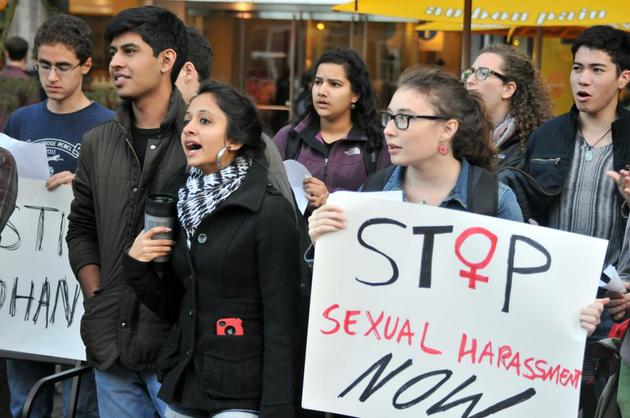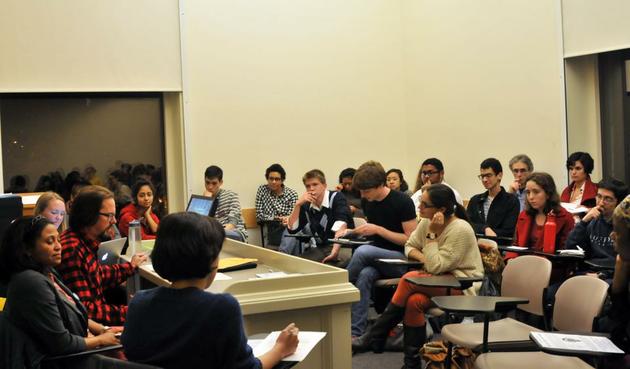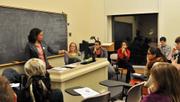By Geoff Carens, Union Rep, Harvard Union of Clerical and Technical Workers (HUCTW), Member, Industrial Workers of the World (IWW)
For many years the Harvard Yard Mail Center was a good place to work and a good place to visit. An article from the Harvard Crimson documents the camaraderie which had helped make the mail room a welcoming place for the hundreds of freshmen who visited to pick up their packages from home. However, a change of management over the past few years has brought repeated complaints of discrimination, well-attended protests by workers and students, and a steady drip of negative publicity that ought to call the new management’s policies into serious question. For almost twenty-five years I’ve acted as an elected union rep in the Harvard Union of Clerical and Technical Workers (HUCTW). I’ve represented union members all over campus, and I have seldom seen such an unfair and unsympathetic approach on the part of managers towards the staff. Three workers’ situations in particular shed light on the many problems found in this workplace.
Marvin Byrd, a 62-year-old African American, has worked in the mail room since 1995. Although Marvin suffers from diabetic foot disease, causing him to need foot braces to walk, he has a strong work ethic and is never content to sit home and collect a disability check. Marvin has consistently sought to augment his technical skills by taking computer courses. Making ends meet on a part-time schedule in the lowest salary grade in our union has been difficult, so Marvin has often put in huge numbers of overtime hours during busy times.
In the spring of 2011, a new management team from Harvard University Mail Services (HUMS) presented Marvin with an ultimatum: he could either accept a cut in his limited part-time schedule or be laid off. On May 12, 2011, Marvin received a letter which forced him to pick one of three “options”: a cut from 29 to 25 hours per week, spread over six days; an even sharper cut to just 20 hours per week; or the unemployment line. The letter stated, “We need a response no later than Friday May 20, 2011. If no response, the layoff package will be the elected option.”
Marvin asked me to be his union rep, and we invoked the grievance procedure laid out in our union contract. We met over many months with two different teams of problem-solvers, each team including one representative from management and one from the union. Marvin and I offered specific proposals in an effort to seek compromise with HUMS administrators. However, throughout the whole process, management has not budged from their initial position. They never offered Marvin any choices other than the ones presented in May 2011, and he could not afford to lose his job or work only 20 hours per week. So, even though he is the oldest worker in the unit and the only one who must use braces to walk, Marvin was forced to accept a curtailed schedule of just 25 hours per week spread over a mandatory six day week. Marvin has a tough commute from subsidized housing in Lynn, made more difficult by his disability. He often gets just a few hours of work in the mail room before he must get back on public transportation for the long ride home.
Although HUMS management has stonewalled the union during the grievance process, Marvin refused to take their actions against him lying down. He filed complaints of discrimination on the basis of race, color, age, and disability at the Massachusetts Commission Against Discrimination (MCAD). On a chilly day last December, a group of workers and students demonstrated against management’s harsh treatment of Marvin, but their approach since then has not changed. HUMS manager Betsy Shortell even emailed Marvin to accuse him of missing a meeting that she planned outside his work hours. Shortell wrote, “You missed a SCHEDULED hr meeting that we now have to come give just to you.” Although she later admitted Marvin wasn’t even supposed to be on duty during the meeting, some animus against him apparently remains. Marvin applied for a promotion from his entry-level job more than four months ago. Although his contract states that he should have received a reply in four weeks, management has still not given him an answer.
Like Marvin, Mamadou Ndiaye has worked at Harvard for many years. He has spent the past five of his fourteen years here working in the Science Center mail room. Mamadou is classified as a “less than half-time” worker, meaning he is not entitled to union membership, health benefits, Harvard contributions toward his retirement, tuition discounts, or any of the other important advantages which union membership brings. Despite his experience, he earns only $11.50 an hour. According to HUCTW’s contract, management’s use of less than half-time workers “should be exceptional and strictly limited, and never at the expense of regular benefited employment. In other words, everyone who does regular Harvard work on a regular basis deserves the benefit of regular employment.” If Mamadou worked 17.5 hours or more for longer than three months, his job could be converted into a regular union job with benefits. Instead he gets just 17 hours per week, as he has gotten throughout his time in the mail room.
Recently, Mamadou noticed two union jobs, whose minimum salary would be more than $16.50 per hour, posted online. After he made efforts to apply for the positions, they were removed from Harvard’s employment site, and Mamadou was told by management that they had been posted by mistake.
Like Marvin and Mamadou, long-serving employee Johany Pilar has suffered from a deteriorating working environment in the Science Center mail room. In late February and March, Johany, who is Latina and has worked in the mailroom since 1998, was repeatedly sexually harassed by a much older, married male co-worker. After Johany complained to management about the harassment, Shortell called and engaged in what struck Johany as victim-blaming. Johany remembers Shortell saying, “I can see you like to hug people,” as if Johany was somehow at fault for the unwanted advances and aggressive physical contact she had faced. Shortell instructed her to “…be nice, try to work together, try to work professionally,” with the person who had harassed her, and gave Johany the responsibility of training him. Feeling trapped, Johany reluctantly attempted to train this co-worker, but only faced more aggressive physical contact from her harasser. Ever since she first reported the unwanted grabbing and come-ons, Johany has been mistreated by HUMS managers.
This May, HUMS manager Chris Tolkacz demanded that Johany cancel a therapy appointment she had set up to cope with this sexual harassment and come to work instead. The pressure was so upsetting for Johany that she had a panic attack in the mail room, collapsed, injured her back, and had to be hospitalized. Johany’s doctor wrote that she could return to work after the hospitalization, but shouldn’t lift more than ten pounds for a week. Management refused to accommodate Johany’s back injury, demanding that she be cleared 100% before returning. As a result, Johany lost a week’s pay.
This wasn’t the end of Johany’s troubles. She tells me that Shortell confronted her in the mail room the morning of June 5, threatening an unspecified “big, big problem,” in the future. Three months later, Shortell made good on her threat, drafting an unfair disciplinary letter that specifically warned Johany that she could be fired. Johany had not received any discipline in 15 years of service at Harvard, until she complained of sexual harassment. Now, after standing up for her right to equal treatment on the job, that job is in jeopardy. She has filed complaints of gender discrimination and retaliation at the MCAD. And in October, she spoke movingly about her experience with rape culture and for fair treatment at work at a panel organized by the Harvard College International Women’s Rights Collective and several other groups.
Students, workers, and other community members have organized to support Johany. Eight student organizations and the Industrial Workers of the World signed on to an open letter to Harvard’s Labor Relations department decrying Johany’s treatment. On October 18, scores of workers and students picketed in support of Johany in front of the Holyoke Center; her co-workers Marvin Byrd and Mamadou Ndiaye, among others, spoke up for her at this demonstration. Her supporters held another spirited picket for her on November 16.
To date the only response from management has been a declaration stating that the mail room workers, including Johany, Marvin, and Mamadou, are now considered “essential staff,” expected to report for work even when the university is shut down during emergencies such as Hurricane Sandy. These workers were not considered “essential” until Marvin and Mamadou defended Johany in public. Mail room workers see this change in classification as just another example of the tit-for-tat retaliation, designed to undermine staff solidarity, which has characterized HUMS’s approach to management. The new policy will make things difficult for Marvin, as a result of his disability; for Johany, who has a heart condition; and for Mamadou, who has children who would not have school during such emergency days.
This is another bitter disappointment for workers in the Science Center mail room, who are becoming accustomed to such crushing news. One would think that all this controversy would pressure HUMS management to change their practices in a number of ways. For instance, HUMS would be wise to reinstate the previous mail room supervisor, HUCTW member Nassim Kerkache, who maintained a safe and equitable atmosphere. Management should remove the retaliatory discipline from Johany’s file and treat her much more sympathetically at work; they should grant Marvin’s request for promotion, which would be his first in 17 years; and they should finally extend to Mamadou regular employment with benefits. HUMS ought to rescind the new, punitive classification of mail room workers as “essential,” for the mail room workers do not do essential tasks like preparing food or insuring students’ safety. These small improvements would go a long way towards rectifying the conditions that have sparked so much angry protest.
Comments:
These are horror stories. It enrages me that the University solicits donations from alumni/ae and yet figuratively beats up on some of its lowest paid employees. It’s hard to understand what HU gains by bringing in such management teams. How much money can they save by nickel and diming hard working employees and further by harrassing them and trying to rid themselves of employees with disabilities? They don’t teach the “virtue” of this kind of behavior to their undergraduates. Shameful.
Colleen Gaines Clark R64
November 24, 2012 at 12:03 pm
We are reminded, yet again, of why Harvard needs a union.Tradition is all very well in some things, but Harvard’s long and disgraceful history of mistreating its lower-paid employees should be discontinued, like yesterday. What a disgrace!
Mary H
November 24, 2012 at 12:56 pm
Harvard top management is directing the harassment of more and more workers while at the same time, refusing to negotiate decent union contracts. The clerical and technical workers union should have had a contract agreement in place by the end of June. Instead, Harvard offers up proposals that will only force a further decline in living standards on thousands of workers at Harvard and we enter the holidays with no agreement and many of us feeling the loss of income as a result of no agreement. As the richest university in the world, instead of setting a high, moral standard in labor relations, the Harvard Corp. has decided to attack the living standards, livelihoods and working conditions of the very people who do the work to make the university function. This is grossly unfair and completely unnecessary given Harvard’s vast (and largely hidden) wealth. The way the mailroom workers are being treated, the way so many of us are being disrespected by Harvard’s rotten labor policies, will not be forgotten. Perhaps President Faust should compare notes with Neil Rudenstine regarding the Living Wage Sit In in 2000 and subsequent re-awakening of the unions on campus. I, for one, feel another occupation coming on. And it’s long overdue.
Jeff Booth
November 24, 2012 at 5:26 pm
Workers control! Workers control! Smash sexism and all other forms of oppression! One big union! A union for all workers!
Haywood
November 24, 2012 at 6:48 pm
A group of roughly 30 people protested on Friday
afternoon on behalf of Johany Pilar, a mailroom worker who says that she
was sexually harassed by a co-worker.
In an address to the
protesters, Pilar told her story about how a male co-worker grabbed her
on several occasions and said he wanted to kiss her. After a few
supporters gave additional speeches over a microphone outside the
Holyoke Center, the group circled the plaza and chanted.
“We need help from you all,” Pilar said.
At the end of the rally, she expressed her appreciation to those who had gathered on her behalf.
“I would like to say thank you,” Pilar said. “I just want justice. That’s it.”
As part of the rally, the protesters entered the Yard and
marched around Massachusetts Hall, which houses University President
Drew G. Faust’s office. Pilar and Geoff P. Carens, Pilar’s union
representative and a Harvard library assistant, handed an employee at
Massachusetts Hall a signed letter that included Pilar’s story and was
addressed to Faust. The group subsequently moved to circle the Science
Center, the building containing the mailroom where Pilar works.
“I
think we’re really getting out there in the public eye,” said Carens,
who helped organize the rally, led many of the chants, and introduced
the speakers.
Pilar has alleged that last spring, a man working
with her in the mailroom said he wanted to kiss her and twice grabbed
her face. Weeks later, Pilar said, he grabbed her hand.
Pilar said
that after she reported the incidents, her managers threatened her with
disciplinary action or termination and prevented her from leaving work
to see a therapist. Pilar first publicly told her story at a panel on gender inequality and “rape culture” in mid-October. Friday’s event followed an initial rally on Pilar’s behalf last month.
University
spokesperson Kevin Galvin has repeatedly declined to comment on the
specific case, but he has said that Harvard takes allegations of sexual
harassment seriously and “maintains a policy of non-retaliation” so that
employees can come forward with complaints, which can then be
investigated.
The letter, which Carens said garnered around 75
signatures, included demands that Pilar receive a new supervisor, a
removal of disciplinary warnings from her file, and “an end to the
pressure and threats.”
—Staff writer Samuel Y. Weinstock can be reached at sweinstock@college.harvard.edu.













































